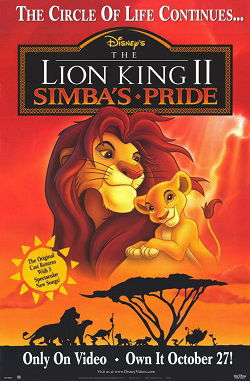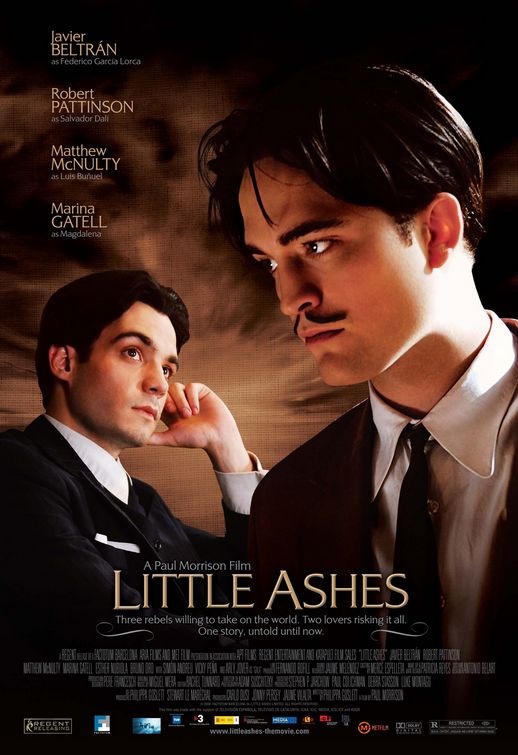“No Satisfaction and No Enlightenment”

| None | Light | Moderate | Heavy | |
|---|---|---|---|---|
| Language | ||||
| Violence | ||||
| Sex | ||||
| Nudity |
What You Need To Know:
LITTLE ASHES is a strident political statement about homosexuality rather than an insightful look at the artistic work of the two men. It attacks the Christian, biblical morality and culture that say homosexual behavior is evil and anti-social. It also supports the anti-religious, left-wing radicals in the Spanish Civil War, who eventually murdered nearly 7,000 priests and nuns during the war. Finally, it contains strong foul language, explicit nudity and a graphic sex scene.
Content:
(RoRoRo, HoHoHo, ABABAB, C, B, SoSo, CoCo, RHRH, LL, VVV, SS, NNN, AA, D, MM) Very strong Romantic worldview with very strong pro-homosexual content, both of which attack the Christian, biblical morality and culture that say homosexual behavior is evil and anti-social (focusing on Spanish Christian society and socio-economic traditions in the 1920s and 1930s) and, although one Catholic main character has problems dealing with his homosexual feelings and two other characters (one of whom is a Marxist) have problems accepting their friend’s homosexuality, in the end the movie promotes an international socialism and a communism that accepts homosexuality as part of leftwing political coalitions and their radical ideology, plus the movie includes a typically left-wing, superficial revisionist history of Spain and the Spanish Civil War (1936 to 1939) that exaggerates the influence of homosexual politics and leaves out the murder of nearly 7,000 priests and nuns (which began pretty much with the legalization of abortion in 1936 by the extreme leftist government) by the leftist movement it apparently idolizes (which was composed of Communists, Socialists and Anarchists as well as liberals); 11 obscenities (mostly the “f” word and one light profanity; a very strong instance of violence where it looks like a woman’s eye is being cut with a razor but the filmmakers allegedly used a cow’s eye in the second shot, plus some strong violence such as several people are executed, newsreel images of war, and man beats up a homosexual out of spite; depicted fornication with implied self-abuse in one scene, men kiss onscreen followed by implied sodomy but one man runs away in disgust or self-loathing, and two men swim provocatively around and close to one another during midnight swim; shots of upper female nudity during montage and in depicted fornication scene, shot of young man’s pubic hair, and rear nudity; alcohol use and drunkenness; smoking; and, conceit, rebellious attitudes, mockery of other people and society, couple plays games with visitor, and greed rebuked.
More Detail:
The movie opens in Madrid in 1922, where the flamboyant 18-year-old Dalí arrives to attend university. Future film director Luis Buñuel, a Marxist and an atheist, is already friends with the poet Federico Lorca, who later becomes active in Spanish leftwing politics during the turbulent 1930s.
The three young men become fast friends, part of an avant garde art movement in the 1920s. Lorca, being Roman Catholic, secretly struggles with homosexual feelings, especially toward Dalí. Eventually, the two begin a tentative romance, but when it comes time to go through with it sexually, Dalí can’t do it. In time, he runs away to Paris to join the avant garde community there with Buñuel, who is disgusted by Lorca’s homosexuality.
Buñuel changes his mind about such perversion, however, when he sees Lorca’s political commitment in the increasingly volatile 1930s, when the government became rabidly anti-Catholic. Meanwhile, Dalí retreats to the celebrity that his surrealist art brings him, and an affair with an older married woman, a Russian immigrant whom he later marries. Dalí’s antics, especially his crave for fame, increasingly disgust Lorca, though Lorca repairs his friendship with the Marxist Buñuel, who becomes one of the most acclaimed film directors of the 20th Century. Tragedy looms, however, when the Spanish Civil War breaks out between the fascists, monarchists, conservatives, and traditional military on one side and the anti-Catholic liberals and radical leftists on the other.
Of course, the anti-clerical radicalism and violence among the left-wing forces, who were supplied by the Soviet Union and the Spanish Communist Party, increasingly led Roman Catholic leaders to seek protection from the fascist forces in Spain, who were supplied by Adolf Hitler’s Germany. The movie does not mention the radical anti-Catholic policies of the leftist activists Lorca associated with during the 1930s. It is estimated that Lorca’s buddies murdered nearly 7,000 priests and nuns during the Spanish Civil War.
The artistic work of these characters is more interesting than the movie’s perverted, propagandistic homoerotic plot. Yet, LITTLE ASHES tells viewers little about the artistic theories and passions that motivated these three men. Ironically, despite the iconoclastic nature of much of their work, Dalí reportedly converted to Roman Catholicism later in his life and Buñuel later disavowed one of the major atheist statements he had made. “It’s guilt we must escape from, not God,” he said in 1977.
The Good News is, of course, that Jesus Christ frees us from the guilt and bondage of our sins, through His sacrifice on the Cross and His resurrection.
LITTLE ASHES contains strong, but brief, foul language, shots of explicit nudity and a graphic sex scene, as well as very strong homosexual references.


 - Content:
- Content: 

